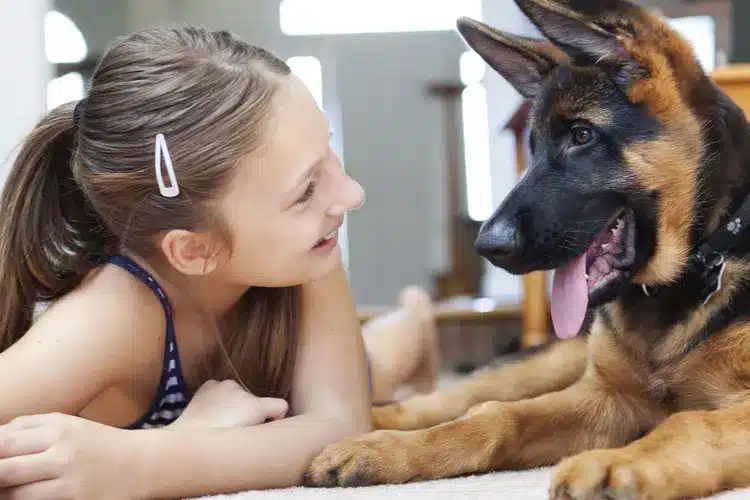Guard dogs have been bred over the years to protect people and property from intruders. Owning a protective dog offers peace of mind, ensuring someone is always watching over the family. These breeds, known for their excellent protection instincts, often come from the American Kennel Club’s Working Group or herding breeds.
Characteristics of Guard Dogs
Good family guard dogs are protective without being overly aggressive. They should be confident, fearless, alert, and loyal. It’s important to research thoroughly to find a guard dog breed that fits your family’s needs, ensuring they are both protective and a loving companion for children.
1. Akita

Originating from Japan, the Akita was used as a hunting and guard dog. With a double coat, a curled tail, and upright ears, this spitz breed bonds closely with its family and is naturally protective. Akitas do best with older children and require proper socialization to avoid aggression. They typically aren’t friendly with other dogs and have a high prey drive, making them unsuitable around small animals.
2. Belgian Malinois

Hailing from Belgium, the Belgian Malinois is a herding breed known for police and military work. They are fearless, protective, and highly trainable, making them excellent guard dogs for families. Belgian Malinois need extensive socialization and training from puppyhood, along with plenty of exercise and mental stimulation.
3. Bernese Mountain Dog

The Bernese Mountain Dog originated in Switzerland as a cattle drover and guard dog. These large, tri-colored dogs are loyal and excellent with children. They are reserved with strangers and will protect their family and property if necessary.
4. Bullmastiff

Originally known as the Game Keeper’s Night Dog, the Bullmastiff was used to stop poachers. Weighing over 100 pounds, they have a formidable presence and are extremely protective. Bullmastiffs require early socialization and training to be discerning and to interact well with guests. They are attached to their families but need careful management around young children due to their size.
5. Doberman Pinscher

Developed by German tax collector Louis Dobermann, the Doberman Pinscher was created to protect him during his rounds. Modern Dobermans are excellent family dogs, bonding tightly with their people and fiercely protective. They need socialization, training, and plenty of exercise to be well-mannered and calm.
6. German Shepherd

Like the Belgian Malinois, the German Shepherd is a herding breed with a long history in police and military work. They are highly intelligent, courageous, and loyal, making them outstanding family dogs. German Shepherds need careful socialization to avoid anxiety and fearfulness, as well as regular exercise and mental stimulation.
7. Great Dane

Despite its name, the Great Dane comes from Germany. Its large size and deep bark deter intruders, though they are generally sociable with people. Great Danes are protective of their families but need early training to avoid knocking over small children due to their size.
8. Great Pyrenees

From the Pyrenees Mountains, the Great Pyrenees has been a flock guardian for centuries. They are protective and alert but bond tightly with their human family. They require socialization and enjoy being outdoors, though they don’t need extensive exercise.
9. Rottweiler

Developed in Germany as a cattle drover, the Rottweiler is powerful and self-assured. Proper training and socialization are crucial to prevent fear-based aggression. Rottweilers are intelligent and need routine, consistency, and positive reinforcement.
10. Saint Bernard

Created by monks for search and rescue in the Alps, the Saint Bernard is gentle and protective, especially with children. Known as “nanny dogs,” they are brave but typically non-aggressive due to their size. Early training and socialization help them become calm and polite family members.
Conclusion
Guard dogs offer protection and companionship for families. Choosing the right breed requires careful consideration of their characteristics, training needs, and suitability for your household. With proper training and socialization, these breeds can be both loyal protectors and loving family members.

